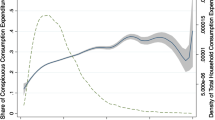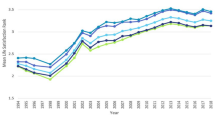Abstract
The present paper proposes to examine the impact of varying consumption categories on life satisfaction at different levels of development by focusing on transition countries and developed European countries. This is done by looking at the Life in Transition Surveys (I and II) that include reported life satisfaction, as well as control variables such as gender, household size, marital status, age, and education (EBRD, http://www.ebrd.com/pages/research/publications/special/lifeintransition.shtml 2007; http://www.ebrd.com/pages/research/publications/special/transitionII.shtml 2011). The study includes several categories such as expenditures on food, education, and durables. The paper also examines the impact of the reduction in several consumption items on life satisfaction after the 2008 crisis. The econometric results reveal that not all consumption items are statistically significant as determinants of life satisfaction. At different levels of development, the relationship between life satisfaction and consumption differs and some consumption categories have a negative impact on life satisfaction. Finally, the reduction in the level of consumption due to economic crises has a negative impact on life satisfaction.
Similar content being viewed by others
Notes
Two meanings of “utility” are distinguished: “Decision utility” is the weight of an outcome of a decision. “Experienced utility,” which is ignored by modern economic theory, is of a hedonic quality and can be reported in real time, or in evaluations of past experiences. Please see: Kahneman et al. (1997).
Although there is a huge debate in the literature as to whether happiness is relative or not (Veenhoven 1991; Oswald 1997; Stutzer 2004; Myers and Diener 1995; Diener et. al. 1993; McBride 2001), most of the economists take it as a matter of course that a higher income leads to greater level of happiness.
The most accurate recall based measure of total expenditure is derived from asking about an exhaustive list of highly disaggregated expenditure items (Please see: Browning et al. 2003).
For detailed information about the methodology please see: (The World Bank (2014) http://data.worldbank.org/indicator/PA.NUS.PPPC.RF.
The results in this paper were substantively the same whether OLS or an ordinal level technique (ordered probit) was used, the results of ordered probit regressions are available to researchers upon request.
References
Blanchflower D, Oswald A (2004) Well-being over time in Britain and the USA. J Public Econ 88:1359–1386
Browning M, Crossley TF, Weber G (2003) Asking consumption questions in general purpose surveys. Econ J 113(November):540–567
Clark Andrew E, Oswald A (1996) Satisfaction and comparison income. J Public Econ 61:359–381
DeLeire T, Kalil A (2010) Does consumption buy happiness? Evidence from the United States. Int Rev Econ 57(2):163–176
Diener E, Oishi S (2000) Money and happiness: income and subjective well-being across nations. In: Diener E, Suh EM (eds) Culture and subjective well-being. MIT Press, pp 185–218
Diener E, Sandvik E, Seidlitz L, Diener M (1993) The relationship between income and subjective well-being: relative or absolute? Soc Indic Res 28(3):195–223
Diener E, Diener M, Diener C (1995) Factors predicting the subjective well-being of nations. J Personal Soc Psychol 69(5):851
Diener E, Suh EM, Lucas RE, Smith HL (1999) Subjective well-being: three decades of progress. Psychol Bull 125(2):276
Duesenberry JS (1949) Income, saving and the theory of consumer behaviors. Harvard University Press, Cambridge
Easterlin R (1974) Does economic growth improve the human lot? In: David Paul A, Reder Melvin W (eds) Nations and households in economic growth: essays in honor of Moses Abramovitz. Academic Press Inc, New York
Easterlin RA (2005) Feeding the illusion of growth and happiness: a reply to Hagerty and Veenhoven. Soc Indic Res 74(3):429–443
EBRD (2007) Life in Transition Survey. http://www.ebrd.com/pages/research/publications/special/lifeintransition.shtml
EBRD (2011) Life in transition Survey, II. http://www.ebrd.com/pages/research/publications/special/transitionII.shtml
Ferrer-i-Carbonell A, Frijters P (2004) How important is methodology for the estimates of the determinants of happiness? Econ J 114(497):641–659
Frank RH (1985a) The demand for unobservable and other nonpositional goods. Am Econ Rev 75:101–116
Frank RH (1985b) Choosing the right pond: human behavior and the quest for status. Oxford University Press, New York
Frank RH (1999) Luxury fever: money and happiness in an era of excess. Princeton University Press, New Jersey
Frey B, Stutzer A (2002) What can economists learn from happiness research? J Econ Lit XL:402–435
Galbraith JK (1999) The affluent society (1958). Penguin Books, Canada
Graham C (2008) Happiness and health: lessons—and questions—for public policy. Health Affairs 27(1):72–87
Guillen-Royo M (2008) Consumption and subjective wellbeing: exploring basic needs, social comparison, social integration and hedonism in Peru. Soc Indic Res 89(3):535–555
Headey B, Muffels R, Wooden M (2008) Money does not buy happiness: or does it? A reassessment based on the combined effects of wealth, income and consumption. Soc Indic Res 87(1):65–82
Hirsch F (1976) Social Limits to Growth. Harvard University Press, Cambridge
Hudders L, Pandelaere M (2012) The silver lining of materialism: the impact of luxury consumption on subjective well-being. J Happiness Stud 13(3):411–437
Inglehart R (1990) Culture shift in advanced industrial society. Princeton University Press, Princeton
Kahneman D, Wakker P, Sarin R (1997) Back to Bentham? Explorations of experienced utility. Q J Econ 112(2):375–405 In Memory of Amos Tversky (1937–1996)
Kenny C (1999) Does growth cause happiness, or does happiness cause growth? Kyklos 52(1):3–25
Kenny C (2005) Does development make you happy? Subjective wellbeing and economic growth in developing countries. Soc Indic Res 73(2):199–219
Layard R (1980) Human satisfactions and public policy. Econ J 90(360):737–750
Layard R (2005) Happiness. Lessons from a New Science. Penguin Books, New York
Marx K (1849) Wage-Labour and Capital. May 2002. http://eserver.org/marx/1849-wage.labor.capital/6-labor.and.capital.txt
McBride M (2001) Relative-income effects on subjective well-being in the cross-section. J Econ Behav Organ 45(3):251–278
Myers DG, Diener E (1995) Who is happy? Psychol Sci 6(1):10–19
Oswald AJ (1997) Happiness and economic performance. Econ J 107:1815–1831
Smith A (1937) The wealth of nations. Modern Library, New York
Stutzer A (2004) The role of income aspirations in individual happiness. J Econ Behav Organ 54(1):89–109
The World Bank (2014) http://data.worldbank.org/indicator/PA.NUS.PPPC.RF
Van Praag BM (1968) Individual welfare functions and consumer behavior: a theory of rational irrationality, vol 57. North-Holland, Amsterdam
Veblen T (1899) The theory of leisure class. Modern Library, New York
Veenhoven R (1984) Conditions of happiness. Kluwer Academic, Dordrecht/Boston/Lancaster
Veenhoven R (1988) The utility of happiness. Soc Indic Res 20:333–354
Veenhoven R (1991) Is happiness relative? Soc Indic Res 24:1–34
Acknowledgments
I would like to express my gratitude to the participants (at EHERO congress titled “Advances in Happiness Economics” at Erasmus University Rotterdam, October 2013) for their valuable comments on the earlier version of this paper. I am indebtedness to Ruut Veenhoven and Luca Stanca who initiated the special issue on consumption and happiness. Finally I would like to thank to my colleagues Maarten Vendrik, Ruut Veenhoven and Ozge Gokdemir and anonymous referees for their valuable comments and suggestions.
Author information
Authors and Affiliations
Corresponding author
Rights and permissions
About this article
Cite this article
Dumludag, D. Consumption and life satisfaction at different levels of economic development. Int Rev Econ 62, 163–182 (2015). https://doi.org/10.1007/s12232-015-0226-z
Received:
Accepted:
Published:
Issue Date:
DOI: https://doi.org/10.1007/s12232-015-0226-z




